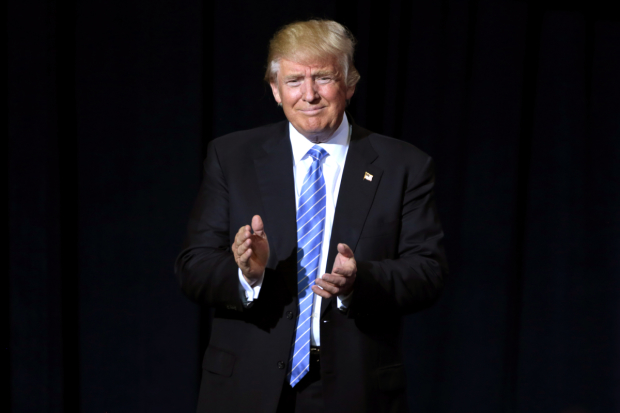Having a Donald Trump Julius Caesar is in bad taste. That's the point

© Photo: Gage Skidmore/Flickr
Death, writes Shakespeare in Julius Caesar, "will come when it will come." Not so for one Donald J Trump. American artists are bumping their president off again and again – and it’s proving controversial.
The comedian Kathy Griffin was berated for posing with the bloodied, decapitated head of the President, while, in his latest music video, rapper Snoop Dogg shot an orange-faced Trump clown with a toy gun.
Now, its Shakespeare‘s turn. A production of Julius Caesar has cast the Roman Emperor in Trump’s clothing. At New York’s Shakespeare in the Park, Gregg Henry plays Caesar in a blond wig and a black suit, red tie dangling below the belt line. His wife, Calpurnia, cuts an equally familiar figure – a svelte Slav in a range of designer dresses – and, at one point, Caesar settles into a gold-gilt bathtub. There is, in other words, no mistaking the target of Oskar Eustis’s staging: Mr and Mrs Trump.
Gregg Henry plays Caesar in a blond wig and a black suit, red tie dangling below the belt line
The comparison has its merits. Shakespeare’s Caesar is a vainglorious, singular and divisive leader; autocratic in some ways, a political force in others. Henry notes that the Roman "became drunk with ego, drunk with power, drunk with ambition and the belief that he and he alone must rule the world." The comparison’s been made elsewhere. Like The Donald, The Julius supposedly favoured a combover.
Of course, Caesar doesn’t make the final curtain. He’s assassinated in act three, and it’s that image that has kicked up a storm. The right-wing press has taken offence, and two major sponsors, Delta Airlines and the Bank of America, pulled out of the production over the weekend. As Inside Edition gawped: "A man dressed to look like President Donald Trump gets stabbed to death on stage." For Delta, that "crossed the line of the standard of good taste," while the Bank of America argued that the production "was intended to provoke and offend."
Is that fair? Leaving aside the corporate decision of both businesses to distance themselves from the production, which raises issues around the ethics of sponsorship and artistic expression, it’s hard to object to their assessment of it. I can’t judge Eustis’s staging from this side of the pond, but it seems self-evident that bad taste plays a part. That is, however, a perfectly legitimate artistic approach.
Theatre is an art-form rooted in ambiguity and association. It’s why it’s able to give censorship the slip
Clearly, any argument that the production is tantamount to incitement has to be baloney. Where the Griffin photograph is more ambiguous – tongue-in-cheek, but easily taken out of context – no-one could mistake Julius Caesar’s intent. You don’t need to be a Shakespeare scholar to know that the play doesn’t advocate or invoke assassination. Indeed, Eustis is, by all accounts, arguing the exact opposite. "Julius Caesar can be read as a warning parable to those who try to fight for democracy by undemocratic means," he said in a statement last week. "To fight the tyrant does not mean imitating him."
However, that same argument exists in every staging of Julius Caesar – Trump-a-like or otherwise. Any direct resemblance is, therefore, gratuitous – and knowingly so. Theatre needn’t be so literal. Julius Caesar is always, somehow, a nation’s head of state. He exists, onstage, as a symbol of that power – with or without a blond thatch and an overlong tie. The parallels are plain to see, and it wouldn’t take much for an actor to tease out the association. In fact, it’s probably harder to detach the play from the political reality than it is to draw the connection.
Equating the real Trump with the fictional Caesar is superficial, and that glibness must turn Shakespeare’s play into a satire
This is theatre’s power – always has been. It is an art-form rooted in ambiguity and association. It’s why it flies under the radar so readily, and why it’s able to give censorship the slip. It’s why Hamlet is always, always political. It is, at heart, a play about killing the king – whosoever the real king might be.
Julius Caesar‘s the same. In 2012, one American production cast an African-American actor in the role and, though there was little likeness to President Obama, one critic noted that "the audience is unquestionably going to read him as an Obama stand-in nonetheless." There was no uproar then.
Literalism can do more harm than good. Draw a like-for-like comparison and a play becomes its own constraint. Where Caesar and Trump diverge, it starts to collapse – as Jesse Green’s New York Times review makes clear. "We are faced," he writes, "with the ways Trump and Caesar never properly scanned, and an aftermath in which that confusion breeds more confusion."
Unsubtlety, arguably, is part of the point. Equating the real Trump with the fictional Caesar is, at some level, superficial, and that glibness must turn Shakespeare’s play into a satire. It makes Trump a figure of fun – someone whose image can be taken in vain – then it sets up the startling image of a presidential assassination. Its Caesar is a kind of effigy for Trump.
In that, then, it bears comparison to Mike Bartlett’s play King Charles III, and the mild uproar over its depiction of the Queen’s death. One Tory MP called that "distasteful," and the director Rupert Goold recognised that, on television at least, the scene needed "the greatest sensitivity." So did its portrayal of Princess Diana’s ghost.
That is in bad taste – of course it is – but that doesn’t make it bad art. It’s the same with Julius Caesar. That’s how it sticks the knife in.










